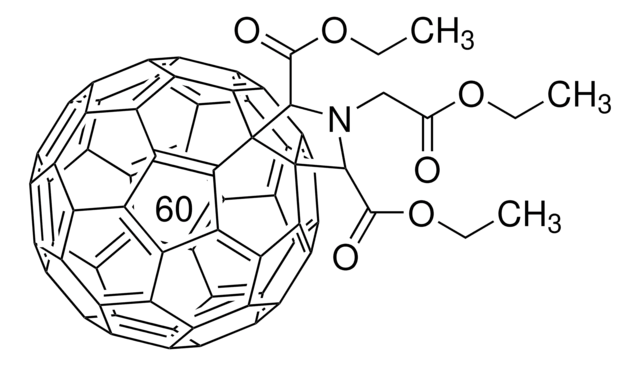793248
Polyhydroxylated fullerenes, water soluble
Synonym(s):
C60(OH)n, water soluble C60, Fullerenols, Polyhydroxy fullerenes
About This Item
Recommended Products
form
solid
color
light yellow to yellow
solubility
water: soluble >50 mg/mL
DMSO: slightly soluble
methanol: slightly soluble
storage temp.
2-8°C
Related Categories
General description
Application
Signal Word
Warning
Hazard Statements
Precautionary Statements
Hazard Classifications
Eye Irrit. 2 - Skin Irrit. 2 - STOT SE 3
Target Organs
Respiratory system
Storage Class Code
11 - Combustible Solids
WGK
WGK 3
Flash Point(F)
Not applicable
Flash Point(C)
Not applicable
Certificates of Analysis (COA)
Search for Certificates of Analysis (COA) by entering the products Lot/Batch Number. Lot and Batch Numbers can be found on a product’s label following the words ‘Lot’ or ‘Batch’.
Already Own This Product?
Find documentation for the products that you have recently purchased in the Document Library.
Customers Also Viewed
Articles
SWCNTs show promise in FETs, solar cells, and photodetectors due to their ultrafast charge transport mobility.
SWCNTs show promise in FETs, solar cells, and photodetectors due to their ultrafast charge transport mobility.
SWCNTs show promise in FETs, solar cells, and photodetectors due to their ultrafast charge transport mobility.
Single-walled carbon nanotubes (SWCNTs) are promising materials for use in the active channel of field-effect transistors (FETs), photoabsorbing layers of solar cells and photodetectors because of their ultrafast charge transport mobility.
Our team of scientists has experience in all areas of research including Life Science, Material Science, Chemical Synthesis, Chromatography, Analytical and many others.
Contact Technical Service


![4-(1′,5′-Dihydro-1′-methyl-2′H-[5,6]fullereno-C60-Ih-[1,9-c]pyrrol-2′-yl)benzoic acid](/deepweb/assets/sigmaaldrich/product/structures/417/736/540e4dd8-0c87-48e5-8307-3befb16498ba/640/540e4dd8-0c87-48e5-8307-3befb16498ba.png)
![[5,6]-Fullerene-C70 98%](/deepweb/assets/sigmaaldrich/product/structures/316/205/6bbd4872-2192-4042-bd5c-a2b6c4edba43/640/6bbd4872-2192-4042-bd5c-a2b6c4edba43.png)




![[6.6] Diphenyl C62 bis(butyric acid methyl ester)(mixture of isomers) 99.5%](/deepweb/assets/sigmaaldrich/product/structures/213/478/93c26667-6556-40bb-8cbe-350bdbabfc00/640/93c26667-6556-40bb-8cbe-350bdbabfc00.png)